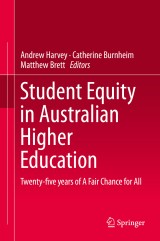Details

Student Equity in Australian Higher Education
Twenty-five years of A Fair Chance for All|
96,29 € |
|
| Verlag: | Springer |
| Format: | |
| Veröffentl.: | 29.03.2016 |
| ISBN/EAN: | 9789811003158 |
| Sprache: | englisch |
Dieses eBook enthält ein Wasserzeichen.
Beschreibungen
This book examines twenty-five years of the Australian framework for student equity in higher education, A Fair Chance for All. Divided into two sections, the book reflects on the legacy of equity policy in higher education, the effectiveness of current approaches, and the likely challenges facing future policymakers. The first section explores the creation of the framework, including the major elements of the policy, the political context of its development, and how it compares with international models developed during the same period. The performance of the six student equity groups identified within the framework is also examined. The second section of the book considers future trends and challenges. The Australian university sector has undergone seismic change in the past twenty-five years and faces further changes of equal magnitude. The twenty-fifth anniversary of A Fair Chance for All comes as Australian higher education is poised for another wave of transformation, with rising expansion, competition, and stratification. While the emerging landscape is new, the questions have changed little since A Fair Chance for All was first conceived: How should we define student equity, and what policies are likely to promote it? <br>
Section 1.- 1 Towards a fairer chance for all: Revising the Australian student equity framework.- 2 Framing the framework: The origins of A Fair Chance for All.- 3 Framing student equity in higher education: National and global policy contexts of A Fair Chance for All.- 4 First Peoples: Aboriginal and Torres Strait Islander participation in higher education.- 5 Out of reach? University for people from low socio-economic status backgrounds.- 6 Disability and Australian Higher Education: Policy drivers for increasing participation.- 7 Ivory towers and glass ceilings: Women in non-traditional fields.- 8 Access, achievement and outcomes among students from non-English speaking backgrounds.- 9 Far from the studying crowd? Regional and rural Australians in higher education.- Section 2.- 10 Higher education and inequality in Anglo-American societies.- 11 Equity and markets.- 12 And Fairness for All? Equity and the international student cohort.- 13 Indigenous Australians and higher education:The contemporary policy agenda.- 14 Ladders of opportunity: Postgraduate equity, professions and the academic workforce.- 15 From equity to excellence: Reforming Australia's national framework to create new forms of success.- 16 Further and higher? Institutional diversity and stratification.
<b>Dr Andrew Harvey </b>is Director of the Access and Achievement Research Unit at La Trobe University in Victoria, Australia. Andrew has published widely in areas of higher education policy, including issues of university access, student equity, retention and attrition, postgraduate education, and students from out-of-home care backgrounds. He currently leads a range of external grant projects covering adaptations to tertiary admissions practices; global citizenship and student equity; and comparative international student equity frameworks.<div><br></div><div><b>Dr Catherine Burnheim </b>is Manager, Partnerships and Pathways at Monash University. Catherine has extensive experience in widening participation policy and practice, working with vocational education providers, rural communities, asylum seekers and mature age students. She writes extensively on higher education issues, including a recent co-authored chapter in The Dawkins Revolution: 25 Years On (G. Croucher et al. (eds), 2013, Melbourne University Press).<br></div><div><br></div><div><b>Matt Brett </b>is Senior Manager of Higher Education Policy at La Trobe University and has worked in equity policy across multiple Australian institutions. He has specific interests in disability and equity issues and previously prepared the University of Melbourne's Social Inclusion Plan, Mental Health Strategy and Disability Action Plan. Matt’s most recent publication on policy issues is a chapter on Equity Policy and Knowledge in Australian Higher Education (In T. Fitzgerald (Ed.), 2014, Information Science Reference).<br></div>
This book examines twenty-five years of the Australian framework for student equity in higher education, A Fair Chance for All. Divided into two sections, the book reflects on the legacy of equity policy in higher education, the effectiveness of current approaches, and the likely challenges facing future policymakers. The first section explores the creation of the framework, including the major elements of the policy, the political context of its development, and how it compares with international models developed during the same period. The performance of the six student equity groups identified within the framework is also examined. The second section of the book considers future trends and challenges. The Australian university sector has undergone seismic change in the past twenty-five years and faces further changes of equal magnitude. The twenty-fifth anniversary of A Fair Chance for All comes as Australian higher education is poised for another wave of transformation, with risingexpansion, competition, and stratification. While the emerging landscape is new, the questions have changed little since A Fair Chance for All was first conceived: How should we define student equity, and what policies are likely to promote it?
Provides the first comprehensive review of student equity policy in Australian higher education since the creation of A Fair Chance for All Examines the impact of sectoral expansion and competition on notions of student equity Critiques the identified student equity groups, and examines other marginalised groups and individuals Includes supplementary material: sn.pub/extras
Diese Produkte könnten Sie auch interessieren:

University Science and Mathematics Education in Transition

von: Ole Skovsmose, Paola Valero, Ole Ravn Christensen

96,29 €















